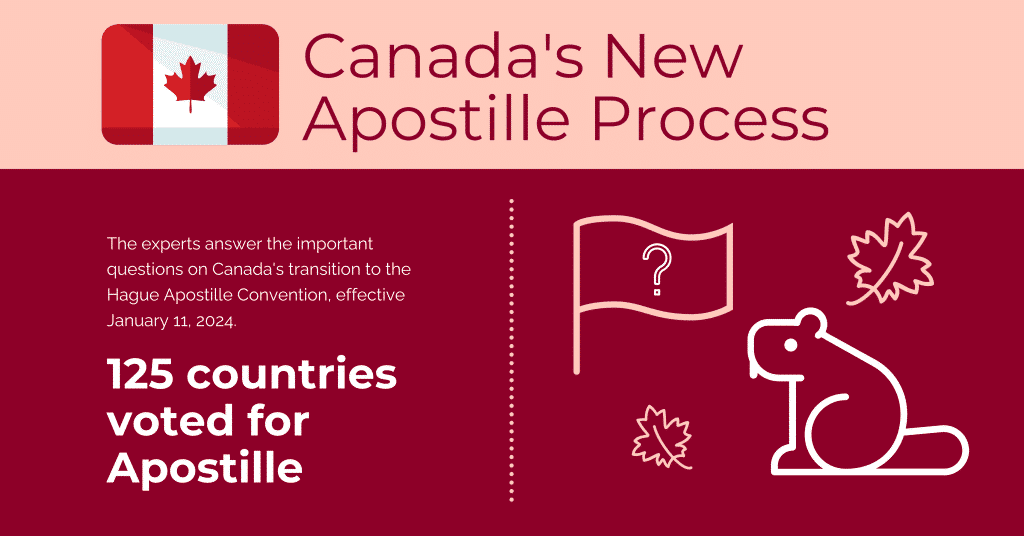
How To Get An Apostille Canada Abroad: A Step-by-Step Handbook
So, you're a Canadian abroad, and you've been asked to get an Apostille or maybe you heard the news about Canada signing the Hague Apostille Convention. Canada's signing of the convention might feel like just another piece of bureaucratic news, but it has real implications for you. Excited to dive deep? Let's go!
What is the Hague Apostille Convention?
Imagine you're playing a game, and each country has its rulebook. Wouldn't it be easier if there were one universal rule? The Hague Apostille Convention aims to be that universal rule for document verification.
Origin and Purpose
The Convention started in 1961 in the city of The Hague, Netherlands. Its primary goal? To abolish the need for legalisation of foreign public documents. It wanted to streamline the process and ensure that documents issued in one country are effortlessly recognized in another.
Process and Procedure
The Convention introduced the Apostille: a certificate provided by the issuing country, verifying the authenticity of the document. Instead of getting embassies involved, the Apostille certifies the document for international use.
Why is Canada Joining Now?
You might wonder, "Why now?" Canada had its reasons for holding back, but the times are a-changing!
Past Canadian Process
Currently and before jumping on the Apostille bandwagon, Canada uses a system of verification known as the "Authentication and Legalization" process. It is lengthier and involved multiple steps, often leading to confusion and delays due to slow processing times at Global Affairs Canada.
Benefits of Joining
With the Apostille system, Canadians abroad can enjoy smoother transactions, fewer stages, and quicker document processing. It's like upgrading from a rickety old bike to a smooth-riding car!
How Apostille Works for Canadians Abroad
The designated competent authorities in Canada who will issue Apostilles thus far are the Alberta Ministry of Justice, British Columbia Ministry of Attorney General, Ontario's Official Document Services (ODS), Saskatchewan Ministry of Justice and Attorney General and Global Affairs Canada. Alright, so how does this change the game for Canadians out of the country?
Essential Documents for Apostille
Key documents like birth certificates, marriage certificates, educational documents and powers of attorney are prime candidates for Apostille. Once apostilled, they’re recognized across all convention countries. Handy, isn't it?
Choosing the Right Authentication Service
Just as you'd choose the best tour guide in a foreign land, it's crucial to select the right authentication service. With the right guidance, the Apostille Canada process can be a breeze.
Potential Challenges and Solutions
No process is without its hiccups. Here's how you can avoid common pitfalls.
Understanding the Nuances
Each country, although adhering to the Apostille Convention, might have slight variations in process. Staying informed helps in avoiding surprises. Also consider a service with excellent shipping skills because getting your sensitive document delivered to the apostille service and back to you can be a challenge in some countries,
Recognizing and Avoiding Scams
With any system comes opportunists waiting to scam. Ensure your service providers are accredited and trustworthy. Would you hand over your passport to a stranger? Treat your documents with the same caution!
Preparing for January 2024
The countdown begins! As Canada gears up for the implementation, here's what you need to keep in mind.
Steps for Canadians Abroad
- Identify documents needing Apostille.
- Choose an accredited service provider.
- Follow the specific guidelines of the country you're in.
Tips and Tricks
- Using Reliable Sources: Just as you'd verify hotel reviews before booking, ensure you're getting your information from trustworthy sources.
- Staying Updated: Changes can happen; staying updated ensures you're never caught off guard.
Conclusion Trust The Experts @ Global Document Solutions
Canada’s decision to join the Hague Apostille Convention in January 2024 marks a significant shift in simplifying document verification for Canadians abroad. With this guide, you're now equipped to navigate these new waters with confidence!
FAQs
- What is the main purpose of the Hague Apostille Convention?
It aims to simplify the process of verifying documents for international use. - How does the Apostille differ from Canada's previous system?
The Apostille system is faster and more streamlined than the "Authentication and Legalization" process Canada previously used. - Are all countries part of the Hague Apostille Convention?
No, but many are. It's essential to check if the country in question is a signatory to the apostille convention. - Can any document be apostilled?
Primary public documents like birth certificates and educational credentials are usually eligible. Always check specifics based on the document and country. - How can Canadians abroad prepare for the Apostille system's implementation in 2024?
Canadians should identify which documents need Apostille, choose a reliable service provider, and follow the guidelines of the country they're residing in.

